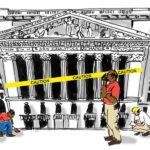The next recession is going to be mild, an economist predicts.
The following is part of a series marking the 10 year anniversary of the financial crisis.
If there is one event that is very unlikely to happen again, it is the financial crisis of 2008, says Tim Duy, economist at the University of Oregon.
“That was a unique event. I get the impression everyone thinks another financial crisis is around the corner. But that was a type of event not seen since the Great Depression.”
The one asset class, mortgage-backed securities, that permeated the financial system and precipitated the Great Recession no longer dominates the financial sector, argues Duy. “I don’t accept that systemic risk will happen again.”
He points to the subprime auto lending market, where a recent uptick in loan defaults have not led to anything near the market disruption caused by subprime mortgage market.
“You can search too hard for obvious risk by focusing on the last crisis,” he says.
The Dodd-Frank Act, which allowed more aggressive regulation of the financial system, has been positive for the sector, says the economist.
Banks, for one, are better capitalized as a result of the legislation. The large banks are also much bigger than they used to be because of consolidation. Big mergers include JPMorgan Chase’s acquisition of Bear Stearns, Bank of America‘s merger with Merrill Lynch, and Wells Fargo’s acquisition of Wachovia.
Banks are bigger, but this also means risk is more concentrated in fewer hands. This doesn’t bother Duy. “People have a tendency to think there is more risk than there really is,” he says.
What about the impact of the ever-growing mountain of consumer debt on the economy? It is not an area of concern, he says. “Consumer debt relative to the size of the economy is actually declining,” he argues.
Despite the strength of the economy and low unemployment, cracks are starting to show in the housing market in the Pacific Northwest where a real estate development boom in places like Portland and Seattle has transformed the face of these cities. The growing number of vacancies of rental apartments indicates supply has caught up with demand.
SEE RELATED STORY: 16,000 APARTMENTS, REDUX
“It has gone from super-hot to hot,” says Duy of the housing market. “I am not seeing anything as devastating as 2006 and 2007. The underwriting conditions are much more stringent. We are not seeing low- to no-documentation mortgages. Credit scores are higher.”
The next recession is not going to be a big deal, predicts the economist.
“No sector of the economy dominates the system. There is no significant imbalance. The recession will be mild compared to the last two rounds.”
Read more on this series on the financial crisis:
The legacy of the financial crisis 10 years on
‘I didn’t see alot of the bad stuff until the end’
‘History doesn’t repeat itself, but it rhymes’
‘Less regulated, non-bank lenders are making higher risk corporate loans’
To subscribe to Oregon Business, click here.







